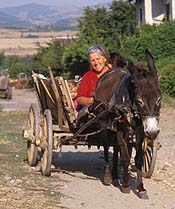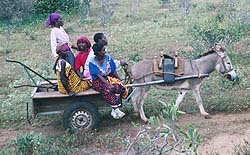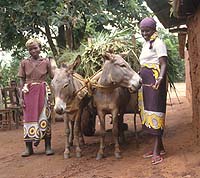|
| With
improved access to transport, women can gain time, income,
productivity, status and independence. |
| Whole families may benefit through
women's access to transport. In some societies, women gain particular
benefits from donkeys that have few gender associations. |
 Woman with a donkey wagon
Woman with a donkey wagon
in Bulgaria |

Women with
donkey cart in Tanga, Tanzania |
|
Women and
donkeys in Tanga, Tanzania
The Tanga Animal Draft Power Project started in north-eastern Tanzania
in 1981. Lack of farm power and transport were identified as crucial
constraints for smallholder farmers. The Project first introduced
work oxen and ox carts and then started to promote the use of donkeys.
When the project started, it was normal to work mainly with male
farmers.Project gender sensitivity increased and more attention
was paid to women farmers. Women started to benefit from the spread
of donkey carts. Women found it easier (socially, economically and
practically) to own and manage donkeys than oxen. Women used donkey
carts for carrying water and fuel wood, harvest products, forage
for animals, goods for trading and people themselves. Donkeys were
also used for plowing and weeding. Initial prejudice against donkeys
was rapidly overcome through practical demonstrations of donkey
employment.
|
|

Women with donkey cart in Tanga, Tanzania
|
Women are often the main transporters, and particular attention needs
to be paid to women's transport needs. In many societies, men generally
own or control large animals (cattle, camels, horses) and transport
devices (cycles, carts). Donkeys are more 'gender-neutral' and women
may find it easy to adopt them. It may seem ironical that women (the
disadvantaged gender) may benefit from donkeys (the most marginalised
of domestic livestock).
|
|

